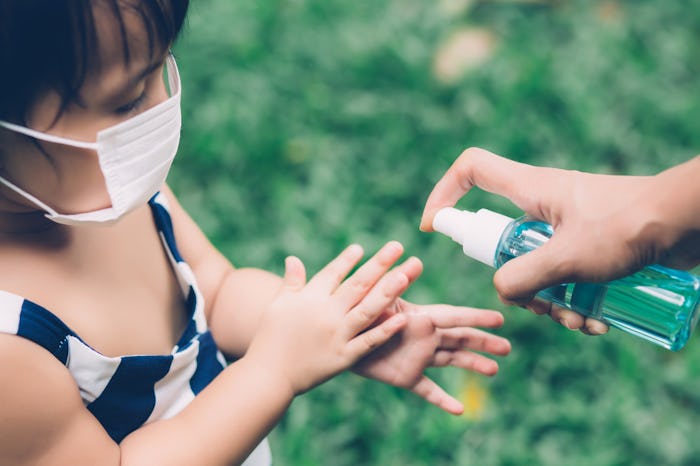Life

An Infectious Disease Expert Breaks Down What You Should Look For On A Hand Sanitizer Label
As the world continues to fight the spread of the coronavirus, having a bottle of hand sanitizer within reach at all times feels pretty commonplace. Demand for the product is still high, unsurprisingly, so finding any online or on the shelves at the store might seem like a win — but before you add any to your cart, make sure you know what to look for on a hand sanitizer label. Some ingredients are ineffective, while others can actually be dangerous.
Unlike some other products, it's easy to check the label on a bottle of hand sanitizer because there shouldn't be too many active ingredients listed. Margaret E. McCort, M.D., a physician specializing in infectious disease at Montefiore Health System in NYC, tells Romper in an email that while there may be fragrances or natural oils (like aloe), "there should not be any other 'active ingredients,' other than either ethanol or isopropyl alcohol" listed on the label. For the most effective formula, you should look for "an alcohol-based sanitizer with at least 60% alcohol," says Anita Sircar, M.D., an infectious disease physician in California. "Many studies have shown that hand sanitizers with 60-95% alcohol kill more germs than sanitizers with lower concentrations," she tells Romper in an email, adding, "[and] alcohol based sanitizers are also more effective than non-alcohol based sanitizers."
Most importantly, there are some ingredients should be avoided. The Food and Drug Administration (FDA) recently added more than 30 hand sanitizers to its list of products with potentially toxic ingredients; specifically, the FDA warned against hand sanitizers with wood alcohol, which can cause blindness, hospitalizations, and even death when ingested or absorbed through the skin. Triclosan should also be avoided, according to Dr. McCort, "because it can increase your risk of an antibiotic-resistant infection, and this ingredient is not well-studied in humans." She also notes that while it's not harmful, benzalkonium chloride "is likely less reliable against bacteria or viruses compared to either ethanol or isopropyl alcohol."
As for kids, Dr. Sircar says there is no need to find a product with a different formula for them. Still, she advises parents to use extreme caution in storing the hand sanitizer when it's not in use. "Many hand sanitizers on the market now are very attractive to children with bright colored bottles and fragrances that children may want to eat them," she says, so the best way to keep your kids safe is to "buy ones with child-resistant caps, or transfer them to child-resistant bottles."
It's important to note that if you have access to soap and water, always opt for that over hand sanitizer. "Handwashing with soap and water whenever possible is better than using hand sanitizer, and hand sanitizer should really only be used when soap and water aren't immediately available," says Dr. Sircar. Dr. McCort agrees, adding that while hand sanitizer and handwashing technically wash away the virus in the same way, "with soap and water you can cover more skin more thoroughly." Still, she says, hand sanitizer is a good choice when you can't get to a sink with soap and water, and recommends "sanitizing your hands on the go and then washing your hands when you return home."
If you think you’re showing symptoms of coronavirus, which include fever, shortness of breath, and cough, call your doctor before going to get tested. If you’re anxious about the virus’s spread in your community, visit the CDC for up-to-date information and resources, or seek out mental health support. You can find all of Romper’s parents + coronavirus coverage here.
Experts:
Margaret E. McCort, M.D., Montefiore Health System
Anita Sircar, M.D., an infectious disease physician in California